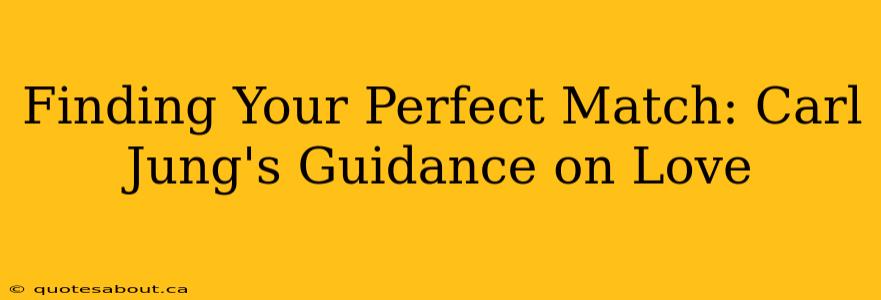Finding lasting love can feel like searching for a needle in a haystack. But what if there was a map, a guide to help navigate the complexities of relationships and discover a connection based not just on fleeting attraction, but on deep psychological compatibility? Carl Jung, the renowned Swiss psychiatrist and psychoanalyst, offers such a map, guiding us towards understanding the intricacies of our own psyche and how it informs our search for a partner. This isn't about finding a "perfect" person, but about finding the person who perfectly complements your own unique wholeness.
Understanding Your Shadow Self: The First Step to Finding Love
Jungian psychology emphasizes the importance of understanding the "shadow self," the aspects of our personality that we repress or deny. These are the uncomfortable, often negative traits we don't want to acknowledge. Ignoring our shadow self can lead to choosing partners who unconsciously embody these very traits, creating conflict and ultimately hindering genuine connection. Before embarking on a search for a partner, Jungian principles suggest a deep dive into self-reflection. Understanding our shadow allows us to consciously choose partners who complement our strengths and challenge us to grow, rather than triggering our unresolved inner conflicts.
What are the Jungian Archetypes and How Do They Relate to Finding a Partner?
Jung identified various archetypes, universal symbols of the collective unconscious, that significantly influence our relationships. Understanding these archetypes – such as the Anima/Animus (the feminine within the masculine and vice versa), the Persona (the social mask we wear), and the Self (the striving towards wholeness) – helps us recognize patterns in our relationships and choose partners who align with our deeper psychological needs. For instance, a person struggling with their Persona might unconsciously seek a partner who either reinforces that mask or challenges them to shed it. Recognizing this pattern allows for conscious choices leading to healthier relationships.
How Can Understanding Jungian Archetypes Improve My Relationships?
By understanding our own archetypal expressions and recognizing them in potential partners, we can move beyond surface-level attraction. This allows us to identify partners who support our journey towards individuation – the process of becoming a whole, integrated self. This isn't about finding someone to "complete" you, but finding someone who supports your journey towards completing yourself.
The Importance of Individuation in Finding Lasting Love
Jung believed that individuation is a lifelong process of integrating conscious and unconscious aspects of the self. This process is crucial for healthy relationships. If we enter a relationship without a strong sense of self, we are more likely to project our unmet needs and unresolved issues onto our partner, creating an unhealthy dynamic. Therefore, Jungian principles suggest focusing on personal growth and self-discovery before actively seeking a romantic partner. The more integrated we are, the healthier and more fulfilling our relationships will be.
Does Jungian Psychology Suggest a Specific Type of Person I Should Look For?
Jungian psychology doesn't prescribe a specific "type" of person to look for. Instead, it emphasizes understanding your own psychological makeup and choosing a partner who complements your strengths and challenges your weaknesses in a constructive way. This means acknowledging your own shadow self and choosing a partner who doesn't trigger its negative aspects, fostering mutual growth and understanding.
Transcending the "Perfect Match" Myth: Embracing Imperfection
The concept of a "perfect match" is often misleading. Jungian psychology suggests that true connection arises from embracing the imperfections of both partners. It's about finding someone who accepts and appreciates you for who you are, flaws and all, and who supports your journey towards wholeness. This doesn't mean settling for less, but rather understanding that true love is built on mutual respect, acceptance, and a shared commitment to growth.
Conclusion: A Jungian Approach to Finding Love
Finding lasting love, through a Jungian lens, is less about finding a perfect match and more about embarking on a journey of self-discovery and understanding. By acknowledging our shadow selves, understanding our archetypes, and embracing the process of individuation, we increase our chances of finding a truly meaningful and fulfilling relationship. It’s about finding a partner who understands and supports the journey, not just the destination. This approach emphasizes personal growth and conscious choice, leading to healthier and more lasting relationships.

